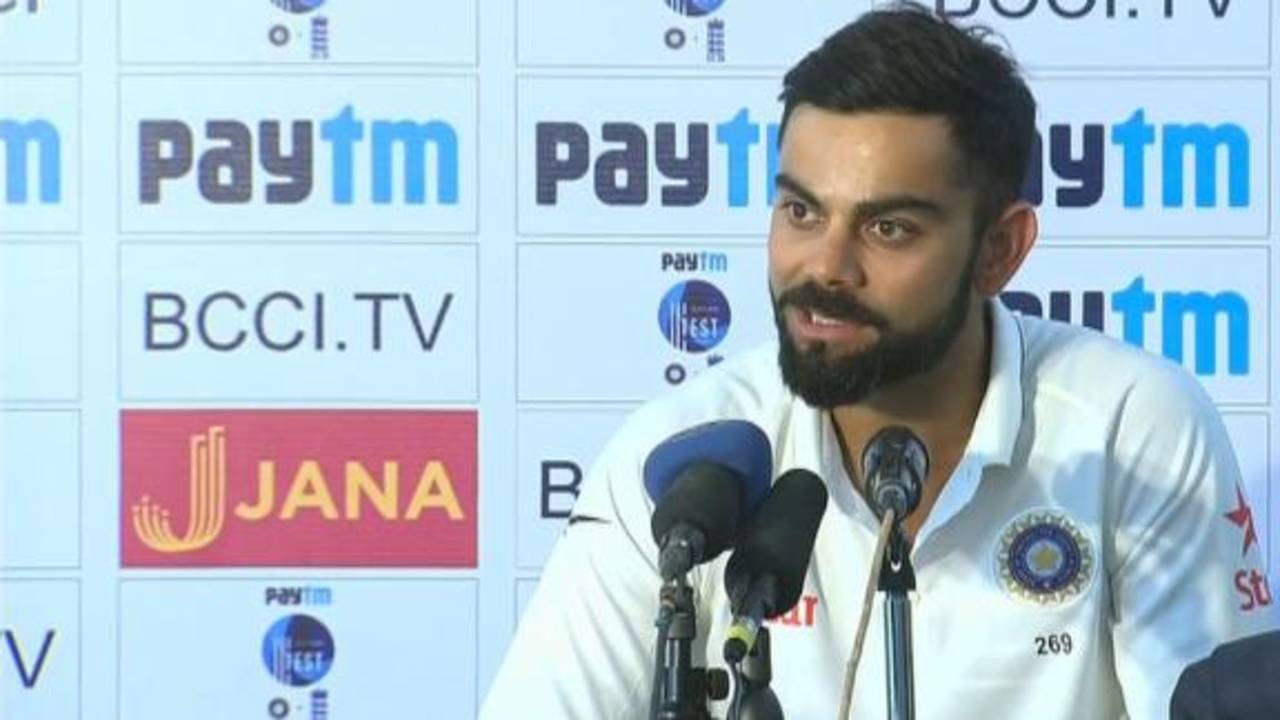Virat Kohli has said England's decision to stonewall in the second innings played into India's hands after they secured a 246-run victory in Visakhapatnam.
Set 405 on a wearing pitch with considerable variation in bounce,
Alastair Cook and Haseeb Hameed dug in for 50.2 overs to put on 75 for the opening stand. It was high-class defensive batting from two batsmen with the technique to pull off such a difficult skill but Kohli felt that, in bowler-friendly conditions, not having the "intent" to score was not the way to go.
"We thought they would come out with more intent, to be honest," Kohli said. "And to see them approach that they had obviously gave us assurance that once we get a couple of wickets, it will crumble pretty quickly because there wasn't much intent from the batsmen."
India were able to break the opening stand late on the fourth day, an R Ashwin grubber pinning Hameed lbw and then, with what became the final ball of the day, Ravindra Jadeja dismissed Cook.
"It was a test of our patience," Kohli said. "We knew that they are going to try and annoy us by playing like this and hope that we lose that our cool, bowl with different plans and do too many things, which we did not. We maintained a similar field throughout.
"It's just that in the last over, the suggestion came from [Cheteshwar] Pujara that we could try probably a different field, have two more on the leg side and make him really defend well in the last six balls. Put a bit of doubt in his head, and it worked.
"He tried to play in front of his pad, not close to the body. That's it, little margins can give you the game. I think that was a crucial breakthrough we needed and end of day's play as well, so the new batsman did not get to face any more deliveries. He knew first thing in the morning, four more balls to go in the over and he's straightaway under pressure. As a batsman, I know that for a fact. It was a pretty crucial dismissal that for us and it really set the tone for us today."
As well as England had played to get to 87 for 2 in 59.2 overs, they lost their remaining eight wickets for only 71 runs and were bundled out 20 minutes after lunch on the fifth day.
Kohli himself made 167 in the first innings, when the pitch was at its best to bat on, but topped it up with 81 off 109 balls in the second innings when the ball began to misbehave quite frequently. He credited his success to a conscious decision not to go into a shell.
"That was the plan. To have intent. It is only if you have intent that you will be able to play the ball accordingly because you are looking to play with the bat. If you don't have intent, and you are looking to control the ball, and if it does something, then you are in no position to control it. So the edges fly off and you are not in position.
"If you are looking for runs, you defend well because your head is on the ball as well. So that was the idea to get runs as the pitch gets tougher to bat on, show intent and keep getting runs in between, extend the lead so the opposition feels the heat of those 30-40 runs. It is a pretty basic thing to do, to be honest, and if you don't have intent in the fourth innings, it is tough to play out four and a half sessions."
Cook, for his part, defended England's tactics saying there were times that players need to adapt and play against their natural way.
"We set our stall out pretty clearly that from the start of the innings that we wanted to take it as deep as possible," he said. "We saw in one game, South Africa played 140-odd overs. If we got to play 150-odd overs then we could have saved the game.
"Often in those circumstances, you just say, 'well I'll just play and we'll see where we end up at.' We made a conscious effort to play that way. Everyone bought into it. It's not some people's natural way of playing. But you say, 'play your natural way and suddenly you're four down then lower order start digging in and you think, 'why didn't we start that right at the beginning of the game'.
"So we made a very clear policy. Of course, when it does not work you feel you could have been more positive. Get the men out around the bat. You make a decision as a captain or as a leadership group. Everyone bought into it and we came up a bit short."
Alagappan Muthu is a sub-editor at ESPNcricinfo
